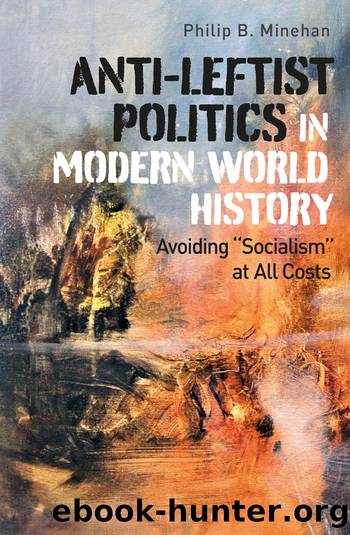Anti-Leftist Politics in Modern World History by Philip B. Minehan;

Author:Philip B. Minehan;
Language: eng
Format: epub
Publisher: Bloomsbury UK
Algeria
The 1954 victory of the Viet Minh over French colonial forces at Dien Bien Phu inspired anti-colonialism across the world. But outside of Indochina, the impact was perhaps nowhere as clear, important, and immediate as it was in Algeria. Ferhat Abbas was one of the leading figures within the National Liberation Front (FLN) that led the liberation struggle to Algeriaâs independence in 1962, when he reflected, âDien Bien Phu was more than a military victory. It is a symbol for all time. It was the Battle Valmy of the colonial peoples, an affirmation of Asian and African man against the European and a confirmation of universal human rights. At Dien Bien Phu France lost its sole claim to a presence in Indochina â the right of the strongest.â17 Several years later, Jean Captain Pouget, formerly of the French Expeditionary Corps in Indochina reflected, âThe fall of Dien Bien Phu marked the end of the colonial period and the beginning of the era of third-world independence. Today there is not a revolt, rebellion or uprising in Asia, Africa or America that fails to invoke General Giapâs victory. Dien Bien Phu has become decolonizationâs 14th of July.â18 Each of these testimonies from mutually opposed figures on the global stage was cast generally; it was a major defeat for France as an imperialist state and victory for anti-colonialism worldwide. However, for the sake of highlighting the virtually fixed character of American anti-Communism worldwide at the timeâblind to so much except the real, potential, or imagined âCommunist threatââit is also important to consider the more particular political character of the Indochinese victory within a comparative framework.
The Viet Minh was a Communist-led leftwing nationalist organization and movement, which evidently secured American support for the French war against it. The Algerian FLN had a far stronger nationalist, noncommunist anti-colonialist leadership and composition, which might have elicited sympathetic treatment from the United States, especially given its larger political-cultural context. In January 1951, the CIA reported that Communism âwas hampered throughout North Africa by a hostile Mohammedanismâ and by âthe vigorous native nationalist movements.â In Spainâs Moroccan and Saharan colonial territories, âthe Franco government has successfully suppressed all possibly Communistic activities.â Even by May 1952, the American ambassador to Egyptâwhere Nasser was two months away from leading a successful coup against the British-backed Egyptian monarchyâreported that France had Algeria under control, and that there was little to no Communist influence on Algerian anti-colonialist opposition.19 But by September, the CIA reported that Algerian nationalists and Communists were showing a willingness to ally with one another against the French. In fact, by this point the Algerian Communist Party (PCA) had come out in favor of independence and was therefore already tacitly allied with the nationalists.20 Suspicions of nationalist-Communist cooperation persisted into the critical time of mid-1954, yet they tended to be inconsistent and often just nebulous. The French governor-general of Algeria, Roger Leonard, downplayed the suspicions. According to the American ambassador to Egypt, the Governor claimed that âhe has the
Download
This site does not store any files on its server. We only index and link to content provided by other sites. Please contact the content providers to delete copyright contents if any and email us, we'll remove relevant links or contents immediately.
The Secret History by Donna Tartt(18098)
The Social Justice Warrior Handbook by Lisa De Pasquale(11945)
Thirteen Reasons Why by Jay Asher(8427)
This Is How You Lose Her by Junot Diaz(6415)
Weapons of Math Destruction by Cathy O'Neil(5805)
Zero to One by Peter Thiel(5468)
Beartown by Fredrik Backman(5322)
The Myth of the Strong Leader by Archie Brown(5223)
The Fire Next Time by James Baldwin(5001)
How Democracies Die by Steven Levitsky & Daniel Ziblatt(4945)
Promise Me, Dad by Joe Biden(4901)
Stone's Rules by Roger Stone(4838)
100 Deadly Skills by Clint Emerson(4674)
Rise and Kill First by Ronen Bergman(4538)
A Higher Loyalty: Truth, Lies, and Leadership by James Comey(4536)
The David Icke Guide to the Global Conspiracy (and how to end it) by David Icke(4365)
Secrecy World by Jake Bernstein(4362)
The Farm by Tom Rob Smith(4313)
The Doomsday Machine by Daniel Ellsberg(4234)
